Czech Republic marvels hysterically at the idea of breaking all ties with Russia
The Czech Senate called the 2014 explosions in Vrbetica "an act of state terrorism against one EU member state, and therefore against the entire EU." As many as 67 out of 72 members of the Czech Senate voted for the relevant resolution, the Czech News Agency reports. The Czech authorities accuse Russia's GRU (The Main Intelligence Directorate) of those explosions.

The Czech senators also called on the government of the country to terminate the agreement on friendly relations and cooperation with Russia and reduce the number of employees of the Russian embassy in Prague to only one person. They believe that the incident in Vrbetica should be discussed at the level of the UN Security Council and the governing bodies of NATO and the EU. They also demanded Russia should pay the Czech Republic a compensation for those explosions and offered to exclude Russia from tenders for the construction of nuclear power plants and other critical infrastructure.
Earlier, the Czech Foreign Ministry set out a protest to Russian Ambassador Alexander Zmeevsky in connection with the expulsion of 20 embassy employees from Moscow and said that Russia's response to a similar measure by the Czech Republic was disproportionatem, TASS reports.
The new Czech Foreign Minister, Jakub Kulganek, who was appointed to this post on April 21, demanded that all diplomats, whom Russia declared persona non grata be returned back.
"All of the expelled employees of the Czech Embassy should return to their places in Moscow. We are expecting the decision be made until 12:00 Thursday. If the decision is not made, we will proceed with the option of bringing the staffs of both embassies into parity in terms of the number of employees," Kulganek said, adding that the expulsion "virtually paralyzed" the work of the Czech embassy in Moscow.
According to Kulganek, in order to establish parity in terms of the number of employees of the Russian Embassy in Prague and the Czech Embassy in Moscow, as many as 60 Russian diplomats must leave Prague.
Commenting on those statements, Russian Foreign Ministry spokeswoman Maria Zakharova said that such a tone of communication was unacceptable and recommended the Czech authorities should keep their ultimatums to themselves, for communication within NATO.
Earlier, the Czech Republic accused Russian special services of the explosion of the ammunition depot on October 16, 2014. According to the Bellingcat investigation prepared in collaboration with The Insider, Der Spiegel and Czech weekly Respek, the operation was personally supervised by Colonel General Andrei Averyanov, commander of Moscow's military unit 29155, which is considered a secret special devision of the GRU. Supposedly, he traveled to Europe under cover shortly before the explosions and then returned to Moscow a few hours after the incident. This was one of two well-known operations, for which General Averyanov personally traveled abroad, the authors of the investigation said.
Two other GRU officers could indirectly participate in the Czech operation — Major General Denis Sergeev and Lieutenant Colonel Yegor Gordienko. The purpose of the sabotage could be the weapon that Bulgarian businessman Emelyan Gebrev was planning to buy. Later, he was assassinated by the same GRU unit, presumably with the use of the Novichok chemical agent. A few months after the poisoning, one of the officers — Denis Sergeev — also arrived in the region not far from the Bulgarian capital. To crown it all, he is believed to be the third suspect involved in the poisoning of former Soviet spy Sergei Skripal and his daughter in the UK.
Another officer of the unit, Nikolai Yezhov (he traveled as Nikolai Kononikhin), bought a ticket to the Austrian capital on October 11, 2014, the investigation report says. Both Yezhov and Averyanov bought return tickets for October 15th.
Investigators still have to find out when and how the GRU group gained access to the ammunition depot to plant the explosives there. Ammunition depot N16 in Vrbetica exploded at 9:25 a. m. on October 16, 2014, having destroying 58 tons of ammunition, demolishing dozens of buildings and killing two depot employees.
According to Czech law enforcement officers, the sabotage could have been arranged by two Russians — Alexander Petrov and Ruslan Boshirov. A few minutes after the explosion of the warehouse, Chepiga and Mishkin boarded an Aeroflot flight from Vienna to Moscow. General Averyanov and Lieutenant Colonel Yezhov returned to Vienna later that day and flew to Moscow afterwards. Now they are wanted on suspicion of involvement in the explosions.
- In 2018, the British authorities accused officers Petrov and Boshirov of poisoning former Soviet spy Sergei Skripal and his daughter Yulia in Salisbury. It was later revealed that GRU officers Alexander Mishkin and Anatoly Chepiga were cloaked by the names of Petrov and Boshirov.
- Against the background of the above-mentioned investigation, the Czech Republic expelled 18 Russian diplomats from the country on April 18.
- The next day, April 19, Russia declared 20 Czech diplomats persona non grata and ordered them to leave the country within 24 hours. The Czech Republic may subsequently decide to expel all Russian diplomats from Prague, First Deputy Prime Minister of the Czech Republic and Interior Minister Jan Hamacek said.
Subscribe to Pravda.Ru Telegram channel, Facebook, RSS!


